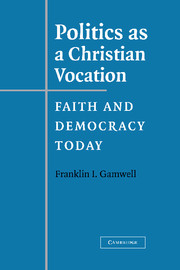Book contents
- Frontmatter
- Contents
- Preface
- Politics as a Christian Vocation
- Introduction: The Present Purpose
- 1 Render to Caesar
- 2 Government by the People
- 3 Faith and the Way of Reason
- 4 Justice in the Community of Love
- 5 Religious Decisions at Stake
- 6 Political Deliberations
- Appendix: On the Humanistic Commitment
- Works Cited
- Index
Introduction: The Present Purpose
Published online by Cambridge University Press: 18 February 2010
- Frontmatter
- Contents
- Preface
- Politics as a Christian Vocation
- Introduction: The Present Purpose
- 1 Render to Caesar
- 2 Government by the People
- 3 Faith and the Way of Reason
- 4 Justice in the Community of Love
- 5 Religious Decisions at Stake
- 6 Political Deliberations
- Appendix: On the Humanistic Commitment
- Works Cited
- Index
Summary
United States politics has always been challenged by its relation to religion, because the First Amendment endorses religious freedom and thus religious plurality. During the past fifty years, this relation has become especially controversial because of increasing diversity among the nation's religions and the increasing consequence of government in our lives. In both larger public and specifically academic discussion and debate, views on the role religious convictions and arguments should or should not play in our common life range from the privatization of religion to its indispensable role in the pursuit of justice. Often, disagreements occur in the context of debate over specific political issues – for instance, the permissibility of abortion, the legitimacy and importance of affirmative action, the due forms of criminal justice, the fair distribution of wealth and income, the required treatment of our natural habitat, and the moral propriety of some given military engagement.
But if our politics must determine its relation to religious plurality, so, correspondingly, does any given religious community face the question of its relation to politics. This work pursues how Christians should ask and answer the latter question. I seek to clarify whether and, if so, how active participation in contemporary politics is a Christian calling. Politically, the discussion is focused principally on the American republic. But that focus itself requires address to general questions about the life of Christian witness.
- Type
- Chapter
- Information
- Politics as a Christian VocationFaith and Democracy Today, pp. 1 - 6Publisher: Cambridge University PressPrint publication year: 2004



